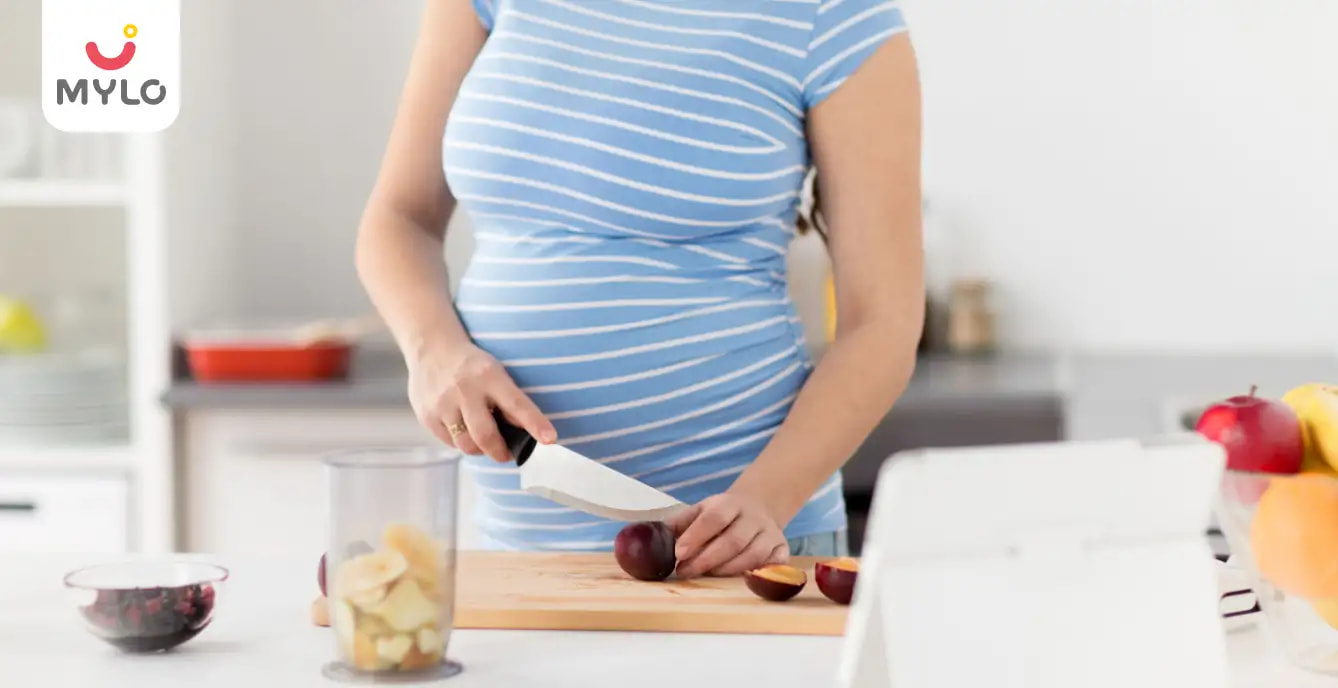- Home

- Pregnancy Best Foods

- Plum in Pregnancy: Benefits, Risks & Side Effects
In this Article
Pregnancy Best Foods
Plum in Pregnancy: Benefits, Risks & Side Effects
Updated on 3 November 2023



Medically Reviewed by
Palak Mittal
clinical nutrition - M.Sc in Food & Nutrition| Post Graduation Diploma in Dietetics
View Profile

Pregnancy is a beautiful and transformative time in a woman's life, but it can also be a time of uncertainty and apprehension. As an expectant mother, you want to ensure that you are doing everything you can to provide the best possible environment for your growing baby. One food that has gained attention for its potential benefits is plum in pregnancy. This sweet and juicy fruit is packed with vitamins and minerals, but what are its risks and side effects?
In this article, we will explore the benefits, risks, and side effects of consuming plum during pregnancy, so that you can make informed decisions about your diet and the health of your baby.
What are plums?
Plum is a member of the same family as the peach, the nectarine, and the apricot. However, plums have a wider variety of cultivars than their stone-fruit relatives. They come in many shapes and sizes, with skin colours like red, purple, green, yellow, and orange and flesh colours like pink, yellow, and orange. There are numerous benefits of plums in pregnancy.
You may also like: Passion Fruit During Pregnancy: Benefits & Side Effects
Is plum good for pregnancy?
If you're wondering, can we eat plum during pregnancy, then, yes, you can. Plums are a safe and nutritious addition to a well-balanced pregnancy diet. They are rich in various essential nutrients like potassium, phosphorus, vitamins A and C, fiber, and antioxidants. Pregnant women should aim to consume five to seven servings of fresh fruits daily, with two plums considered one serving.
However, excessive consumption may aggravate blood sugar issues, and women who are prone to kidney stones should avoid them. Pregnant women should eat fresh plums instead of dried ones for better nutrient content.
Benefits of plum in pregnancy
There are several plum fruit benefits during pregnancy including benefits of plums during pregnancy first trimester:
1. Helps fight anaemia
Most pregnant women experience some form of anaemia, but iron deficiency anaemia is more common. Eating iron-rich meals like plum during pregnancy can help stave off this illness. Plums are beneficial to eat during pregnancy because they contain iron, which can produce new blood cells. Eat them regularly to ward off anaemia.
2. Helps with constipation
Plums are great for your digestive health because of the high fibre content they contain. This fruit has been shown to have a laxative effect, easing the symptoms of constipation by encouraging the smooth passage of stool through the digestive system.
3. Prevents preterm labor
Plums are rich in magnesium and because magnesium aids in the relaxing of cervical muscles, eating plums in pregnancy may reduce the likelihood of premature contractions and delivery.
4. Strengthens the bones
Vitamin A, which is abundant in plums, has been shown to promote healthy bone growth and development. Plus, plums have the minerals and vitamins necessary for strong bones, including potassium, vitamin K, calcium, and phosphorus.
5. Reduces anxiety and fatigue
Pregnancy-related stress and exhaustion are common concerns. Plums include vitamins, minerals, and antioxidants that work together to support various biological processes and increase energy, which can mitigate negative side effects.
How many plums can you eat during pregnancy?
A pregnant woman can safely consume between 150 to 200 gms of fresh plum during pregnancy every day i.e. 2 to 3 plums. You should eat fresh plums exclusively, not dried ones, and in moderation. Plums are tasty and healthy but eating too many of them at once can cause some unpleasant effects.
Risk factors of eating plum in pregnancy
Eating plums during pregnancy can have risks, especially for women who have or had kidney stones, due to the oxalate content in plums. It is advised that such women avoid eating plums during pregnancy. Additionally, swallowing the pit of a plum can cause injury or choking, so it's important to remove it before consuming the fruit.
However, plums can be a good source of nutrients such as potassium, magnesium, calcium, vitamins A and C, and can provide various benefits during pregnancy when consumed in moderation.
You may also like: Cherry in Pregnancy: Benefits & Side Effects
Potential side effects of plum during pregnancy
Actually, there are no known side effects of eating plum for pregnancy. In fact, plums are considered safe and beneficial for pregnant women, as they are rich in nutrients that can help fight anaemia, constipation, and fatigue, prevent preterm labor, and strengthen bones.
However, pregnant women with kidney problems should avoid plums due to their link to kidney stone production. Also, it is important to be cautious not to swallow the pit and to avoid crushing or chewing it due to the presence of cyanide.
What does it mean if you have a plum craving during pregnancy?
Although there is no conclusive evidence, some theories suggest that pregnant women may crave plums due to hormonal changes or a deficiency in vitamin C. However, cravings for plums or any other fruit during pregnancy are normal and harmless.
Safe ways to eat plum during pregnancy
Here are some delicious and safe ways to eat plums and reap plum fruit benefits during pregnancy:
- Always wash plums before eating or using them in a recipe.
- Blend plums into a sauce. Plum sauce goes well with toast, pancakes, and waffles
- Combine plums with berries like blueberries, strawberries, or raspberries for a delicious salad. Adding mint and honey can improve the flavour.
- Plums are a nutritious addition to a bowl of cereal or a trail mix for breakfast.
- Enjoy a delicious drink by blending fresh plums.
- This fruit can also be used to make jams and jellies.
- Plums, when used in moderation, may be a wonderful and beneficial part of a healthy pregnancy diet.
You may also like: Benefits of Eating Kiwi Fruit During Pregnancy
Frequently asked questions
1. What are the benefits of black plum during pregnancy?
Magnesium (mg), which is found in black plums (also known as Jamun), is crucial in preventing preterm births. It also aids in fetal growth and development.
2. Can I eat plums every day while pregnant?
As long as your doctor doesn't object to it, you can eat plums every day. Just make mix and match them with a variety of other fruits and give a gap every now and then to minimise your risk of kidney stones.
Final thoughts
In conclusion, plum in pregnancy can be a healthy addition to your diet. They are packed with nutrients such as fiber, vitamins, and minerals that are essential for a healthy pregnancy. However, it is important to consume them in moderation and to consult with a healthcare professional before making any significant changes to your diet during pregnancy. With the right precautions and a balanced diet, plums can be a tasty and nutritious snack for expectant mothers.
References
1. Monsefi M, Parvin F, Farzaneh M. (2013). Effects of plum extract on skeletal system of fetal and newborn mice. Med Princ Pract.
2. Igwe EO, Charlton KE. (2016). A Systematic Review on the Health Effects of Plums (Prunus domestica and Prunus salicina). Phytother Res.
Tags





Medically Reviewed by
Palak Mittal
clinical nutrition - M.Sc in Food & Nutrition| Post Graduation Diploma in Dietetics
View Profile


Written by
Roohi Kalra
Get baby's diet chart, and growth tips

Related Articles
Related Questions
Hello frnds..still no pain...doctor said head fix nhi hua hai..bt vagina me pain hai aur back pain bhi... anyone having same issues??

Kon kon c chije aisi hai jo pregnancy mei gas acidity jalan karti hain... Koi btayega plz bcz mujhe aksar khane ke baad hi samagh aata hai ki is chij se gas acidity jalan ho gyi hai. Please share your knowledge

I am 13 week pregnancy. Anyone having Storione-xt tablet. It better to have morning or night ???

Hlo to be moms....i hv a query...in my 9.5 wk i feel body joint pain like in ankle, knee, wrist, shoulder, toes....pain intensity is high...i cnt sleep....what should i do pls help....cn i cosult my doc.

Influenza and boostrix injection kisiko laga hai kya 8 month pregnancy me and q lagta hai ye plz reply me

RECENTLY PUBLISHED ARTICLES
our most recent articles

Diet & Nutrition
গর্ভাবস্থায় আলুবোখরা: উপকারিতা ও ঝুঁকি | Prunes During Pregnancy: Benefits & Risks in Bengali

Diet & Nutrition
গর্ভাবস্থায় হিং | ঝুঁকি, সুবিধা এবং অন্যান্য চিকিৎসা | Hing During Pregnancy | Risks, Benefits & Other Treatments in Bengali

Women Specific Issues
স্তনের উপর সাদা দাগ: লক্ষণ, কারণ এবং চিকিৎসা | White Spots on Nipple: Causes, Symptoms, and Treatments in Bengali

Diet & Nutrition
গর্ভাবস্থায় পোহা: উপকারিতা, ধরণ এবং রেসিপি | Poha During Pregnancy: Benefits, Types & Recipes in Bengali

Diet & Nutrition
গর্ভাবস্থায় মাছ: উপকারিতা এবং ঝুঁকি | Fish In Pregnancy: Benefits and Risks in Bengali

Diet & Nutrition
গর্ভাবস্থায় রেড ওয়াইন: পার্শ্ব প্রতিক্রিয়া এবং নির্দেশিকা | Red Wine During Pregnancy: Side Effects & Guidelines in Bengali
- ইনার থাই চ্যাফিং: কারণ, উপসর্গ এবং চিকিৎসা | Inner Thigh Chafing: Causes, Symptoms & Treatment in Bengali
- গর্ভাবস্থায় ব্রাউন রাইস: উপকারিতা ও সতর্কতা | Brown Rice During Pregnancy: Benefits & Precautions in Bengali
- Velamentous Cord Insertion - Precautions, Results & Safety
- Unlock the Secret to Flawless Skin: 7 Must-Have Qualities in a Face Serum
- Unlock the Secret to Radiant Skin: How Vitamin C Serum Can Transform Your Complexion
- Gender No Bar: 10 Reasons Why Everyone Needs a Body Lotion
- Unlock the Secret to Radiant Skin How to Choose the Perfect Body Lotion for Your Skin Type
- Top 10 Reasons to Apply a Body Lotion After Every Bath
- Communication in Toddlers: Milestones & Activities
- How to Improve Vocabulary for Toddlers?
- A Comprehensive Guide to Understanding Placenta Accreta
- Vulvovaginitis in Toddlers Causes, Symptoms and Treatment
- A Comprehensive Guide to Understanding Cerebral Palsy in Children
- Bitter Taste in Mouth During Pregnancy: Understanding the Causes and Remedies


AWARDS AND RECOGNITION
Mylo wins Forbes D2C Disruptor award
Mylo wins The Economic Times Promising Brands 2022
AS SEEN IN
















At Mylo, we help young parents raise happy and healthy families with our innovative new-age solutions:
- Mylo Care: Effective and science-backed personal care and wellness solutions for a joyful you.
- Mylo Baby: Science-backed, gentle and effective personal care & hygiene range for your little one.
- Mylo Community: Trusted and empathetic community of 10mn+ parents and experts.
Product Categories
baby carrier | baby soap | baby wipes | stretch marks cream | baby cream | baby shampoo | baby massage oil | baby hair oil | stretch marks oil | baby body wash | baby powder | baby lotion | diaper rash cream | newborn diapers | teether | baby kajal | baby diapers | cloth diapers |





